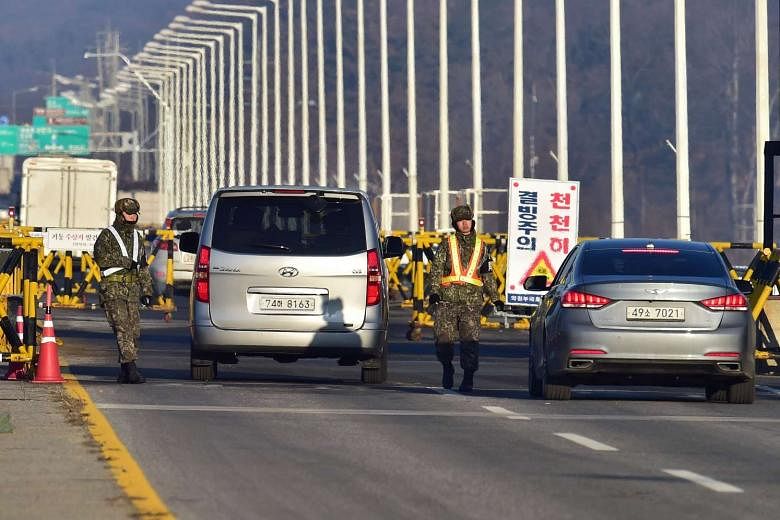PAJU, SOUTH KOREA (AFP) - A stressful mix of anger and anxiety was the dominant feeling among scores of South Korean businessmen crossing the border on Thursday (Feb 11) into North Korea to oversee the death of a decade-long investment.
A day after Seoul announced it was shutting down the jointly run Kaesong industrial park, which lies 10km inside North Korea, the heavy border traffic was almost exclusively in one direction - northwards.
Given barely any notice of the government's decision, owners of the 124 companies operating factories in Kaesong dispatched trucks and managers to the complex in the early morning to start organising an evacuation.
"I'm speechless at what has happened," said Jang Ik Ho, a manager with an engineering company in the complex.
"The companies have all done our best to make things work, and now this happens. What did we do to deserve this?" Jang said, as he prepared to cross into the North.
Jang's remarks reflected a general sense of outrage among Kaesong's South Korean business community over the shutdown order.
Opened in 2004 as a symbol of inter-Korean reconciliation, the project had - until now - proved remarkably immune to the regular upheavals in North-South relations.

But awareness that much of the money the North made from Kaesong went to leader Kim Jong Un's inner circle and the country's nuclear weapons programme has always grated, and last month's nuclear test followed by a long-range rocket launch on Sunday (Feb 7), proved the final straw.
The government in Seoul said the closure decision was "unavoidable" in the circumstances, but company owners insisted their businesses were being liquidated by bad politics.
"It's as if we're just being ordered to jump off a cliff," said Jeong Gi Seob, head of the Kaesong owners' association.
North Korea has yet to respond officially to the shutdown, and a number of those crossing the border were wary of entering a potentially volatile situation.
Seoul has demanded that Pyongyang grant safe passage to all its citizens, but there are concerns that some might find themselves detained if the North Korean authorities try to leverage their release.
"It would be a lie to say I'm not worried about my personal safety," said Yoon Sang Young, who has worked in the same textiles factory in Kaesong for eight years.
"But I am trusting the government's words that it will ensure the workers' safety," Yoon said.
Among those crossing Thursday (Feb 11) was Kim Hak Ju, a manager for a utilities supplier who was tasked with cutting off LPG supplies in Kaesong.
"I've been told to stay there until Saturday (Feb 13)," said Kim, who wasn't unduly worried about his own security. "But, like the others, I'm very frustrated," he said. "When I heard the news, I thought to myself, 'what we all feared is finally happening'."
The few South Koreans crossing the border in the other direction said none of the 53,000 North Korean workers employed in Kaesong had come to work on Thursday (Feb 11).
Kim Soo Hee, a nurse working at a medical clinic in the complex, said some of the North Koreans seemed to have been aware a shutdown was possible, and had been asking her for several days if Kaesong might close.
"I'm worried about how this will affect them because, honestly speaking, their physical condition has been greatly improved by working in Kaesong.
"They get electricity and water and they gain weight because they eat properly," Kim said.
The South Korean firms pay hard currency wages, but those are appropriated by the North Korean authorities who then pay the workers a fraction in local currency.

